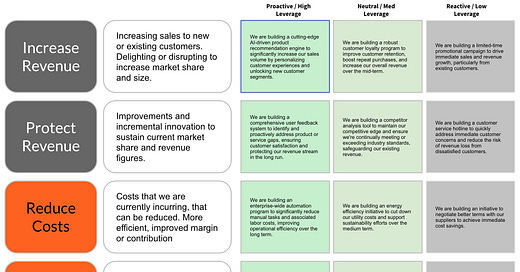I’ve always loved Joshua Arnold’s article Understanding Value. Arnold’s article describes four “benefit types”: increase revenue, protect revenue, reduce costs, and avoid costs. It is especially relevant, given that many companies are trying to simultaneously focus on increasing revenue, retaining cost-conscious customers (protecting revenue), and reducing/protecting costs. You can’t just focus on increasing revenue.
I was re-reading the article recently, and it occurred to me that “leverage” would be a great addition. Why? Not all ideas are equal.

(Note: ChatGPT helped me fill in the matrix. It did an OK job, but not my finest prompt work)
A reactive bet designed to increase revenue in the short term is extremely low leverage. You’re shifting the burden to future efforts to protect that revenue. If you incur debt, you’re shifting the burden to future costs. Meanwhile, the non-sexy infrastructure efforts that can permanently speed up development and increase employee retention are extremely HIGH leverage. In addition to immediately reducing costs, they unlock all sorts of things—including efforts to increase revenue and protect revenue.
Not all revenue increases are equal. Sustainable, differentiated, and defensible revenue growth differs greatly from reactive, generic, and copyable growth. Same with costs. Anyone who has gone through a reactive cost-cutting exercise knows that story. Realistically, you aren’t cutting the expenses. You’re just shifting them...
In a capital and budget-constrained environment, all four value drivers matter! But leverage ALSO matters…everywhere.




Too many founders and CEOs are addicted to short-term revenue. Gotta get that next deal to stay afloat (taking on both revenue and tech debt), and then when costs invariably rise they again follow the knee-jerk immediate action (staff layoff).
There's a lot of pressure on company CEOs and boards to keep the lights on, so the drive for revenue is understandable. Product people tend to think long term, which often clashes with the former. As in everything, there needs to be empathy and balance.
Where does the strategy of bleeding costs to get more users fit into this?